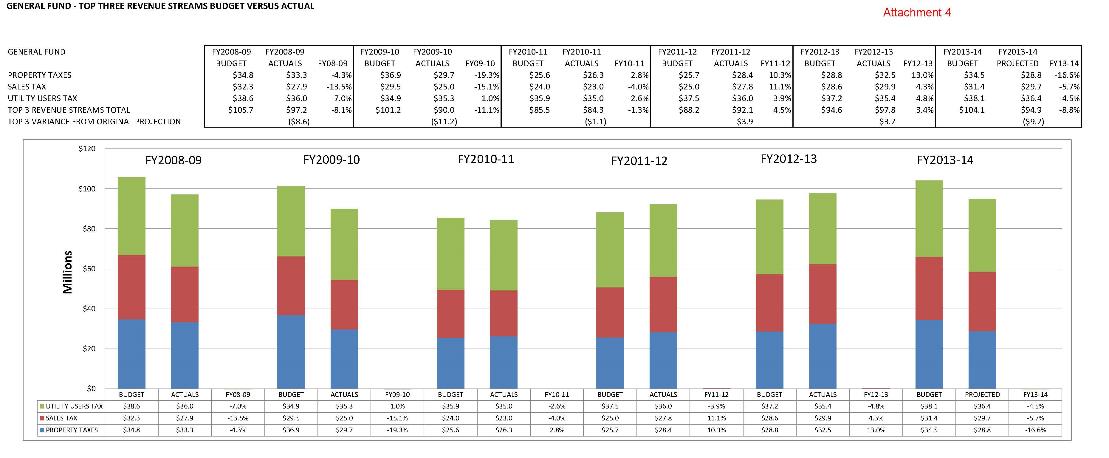| |
Here is the simple explanation of how we got here. Sales taxes and utility users taxes have remained flat since before the recession, and property taxes have declined. Meanwhile, the expenses of operating a city continue to climb, particularly for compensation, which continued to be adjusted upward to match inflation, the SF Bay Area Consumer Price Index and regional market conditions.
The decline in property taxes is due to (1) the Chevron fire, and (2) undervaluing of Richmond real estate by the county assessor. Despite Zillow showing that Richmond home values have gone up 33.7% over the past year, and Zillow predicts they will rise 11.9% within the next year, the assessor substantially devalued Richmond real estate, resulting in a significant drop in property tax revenue.
Foreclosures will be a factor impacting home values in the next several years. In Richmond 3.0 homes are foreclosed (per 10,000). This is greater than the San Francisco Metro value of 1.7 but lower than the national value of 4.8
Mortgage delinquency is the first step in the foreclosure process. This is when a homeowner fails to make a mortgage payment. The percent of delinquent mortgages in Richmond is 6.2%, which is lower than the national value of 7.2%. With U.S. home values having fallen by more than 20% nationally from their peak in 2007 until their trough in late 2011, many homeowners are now underwater on their mortgages, meaning they owe more than their home is worth. The percent of Richmond homeowners underwater on their mortgage is 27.8%, which is higher than San Francisco Metro at 10.5%.

Richmond grapples with budget deficits, layoffs likely
By Robert Rogers
Contra Costa Times
Posted: 06/24/2014 10:12:00 PM PDT0 Comments | Updated: about 9 hours ago
RICHMOND -- Wrestling with a budget deficit that had soared as high as $20 million, city management and finance officials said Tuesday they drove the deficit down to $5.4 million, but that more painful cuts must be made.
"The bad news is that you still have a structural imbalance," City Manager Bill Lindsay told the council. "You would eventually run out of money, that's why we feel there is additional work to be done to get that down lower."
The projected 2014-15 General Fund budget, which the council must by law pass July 1, stands at $138.8 million in expenditures and $133.4 in revenues, and leaves a reserve fund of about $11 million.
The new numbers represent significant progress since last month, Lindsay said, as department heads developed plans to reduce their budgets by 17 percent each. The new proposal includes deep cuts to public works, police, fire and library and cultural services departments, some of which come from deferrals of salary increases and more than 30 proposed layoffs.
But more must be done in the coming week, and it is not clear precisely who will give up how much.
"We have 6 labor unions working very closely with the city," Lindsay said. "The unions are very interested in avoiding layoffs."
Nearly $3 million of proposed cuts so far come in personnel, including the potential loss of 18 permanent positions in several departments, Lindsay said.
According to a staff report, the city has already wrung about $14 million from its budget, including $3.7 million from public works and $2.8 million from the Police Department, much of it in overtime cuts and cuts to the city's Code Enforcement Department, which is part of the Police Department.
The biggest reason for the shortfall was an unexpected 14.62 percent drop in property tax revenues last year, due in part to a destructive fire at Chevron's Richmond refinery in 2012, making Richmond the only city in Contra Costa County to see a decrease in property tax revenues at a time when housing prices are on the rebound. Lindsay said a $1 billion modernization project at the refinery, which is scheduled to get a planning commission vote next month, could generate more than $3 million in new tax revenues if approved, but the new funds would probably not come in until the next budget year.
The city's total expenditures are already down from a high of $146.4 million in 2011-12. About 780 people work for the city today, down from more than 900 in 2005, according to Lindsay.
Other cuts include slashes to the Office of Neighborhood Safety -- a novel program that looks to get violent offenders into job training or college -- which is facing a cut of about $580,000, or roughly 20 percent of its overall budget.
The range of cuts will be felt in the community, according to a city staff report. The "sister city" program with international partner will be defunded, police will not be able to always maintain minimum staffing levels and will eschew some inspections of alcohol and tobacco selling businesses, a fire engine or truck company being taken out of service and longer lines and wait times at the library, according to the report.
On the bright side, no libraries will be closed, according to the report. Library closures have occurred during past budget crunches.
But more than a dozen residents spoke in opposition to cuts in the city's arts and culture programs, which could lose nearly $500,000.
Councilman Corky Booze lobbied hard for deeper cuts to code enforcement, raising eyebrows because that department has investigated him for allegedly maintaining unlawful junkyards in the city.
"Code enforcement is hit hard, to Corky's uninhibited delight," in the proposed budget, said Councilman Tom Butt. "His solution is to lay them all off."
Booze called the budget deliberations a "game of three-card Molly," and suggested that there should be layoffs in Code Enforcement to save other jobs.
Contact Robert Rogers at 510-262-2726. Follow him at Twitter.com/sfbaynewsrogers
|
|

